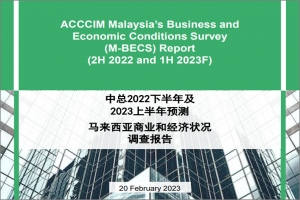Serc
THE STRAITS TIMES
Expansionary spending and fiscal discipline
2023 Budget and Economic Prospects
-
The retabling of new Budget 2023 reinforces economic resilience; addressing immediate concerns about cost of living pressures; and implementing reforms for growth and business sustainability.
-
Ministry of Finance (MOF) expects the economy to slow to 4.5% in 2023 (2022: 8.7%) from an estimated 4.0%-5.0% in the original Budget due to:
i. Slower global economy;
ii. Normalisation of domestic demand; and
iii. Decelerating exports;
2023 Budget – Measures and Initiatives
-
The fiscal policy remains expansionary and continues focusing on improving the inequality and sustainability agenda.
-
FOR RAKYAT: Financial assistance and subsidies as well as equality measures (personal tax adjustment, shift of wealth, social protection, etc.) aim for a more targeted and fairer economy.
-
FOR BUSINESSES AND INVESTMENT: Incentives, financing and loan facilities, assistance for SMEs, agriculture and tourism remain supportive.
-
FOR SUSTAINABILITY: Green initiatives and Environmental, Social and Governance (ESG); financing for sustainable Development; and 5G infrastructure.
ACCCIM Malaysia's Business and Economic Conditions Survey (M-BECS) Report 2H 2022 and 1H 2023F
The Associated Chinese Chambers of Commerce and Industry of Malaysia’s (ACCCIM) Malaysia’s Business and Economic Conditions Survey (M-BECS) was conducted from 15 November 2022 to 31 January 2023, covering the second half-year of 2022 (Jul-Dec 2022) and expectations for the first half-year of 2023 (Jan-Jun 2023), has received 761 responses.
The survey is a good barometer to gauge Malaysian Chinese business community’s assessment and expectations about domestic business and economic conditions as well as their prospects.
It covers questions to measure expectations about the prospects of economic and business performance; the main factors affecting business performance; and to gauge the implications of current issues and challenges faced by businesses.
This survey report is collaborated with and prepared by Socio-Economic Research Centre (SERC).
ACCCIM Malaysia's Business and Economic Conditions Survey (M-BECS) Report 2H 2022 and 1H 2023F
ACCCIM Malaysia's Business and Economic Conditions Survey (M-BECS) Report 2H 2022 and 1H 2023F




To view full report and presentation slides, please follow the link below:
https://www.acccimserc.com/research/m-becs2h20221h2023f
Related news:
- (i) 通膨生活费涨商业成本高 中总调查:上半年经济更差
(ii) 中总寄望安华访华 引进更多中企来马
(iii) 产假增 华商倾聘男性 中总:影响提高女性入职率
星洲日报
- (i) 中总调查:产假增带来负面影响 老板转聘男员工
(ii) 中总调查:外部不确定因素持续 企业谨慎看待未来
(iii) 中总问卷调查咸认增长放缓 企业较看好下半年经济
南洋商报
- 28.7%受访业者看好下半年经济会改善 卢成全冀财案维持经济复苏力度
东方日报
- 雇用修正法令生效 80%商家叹加重营运成本
中国报 - 2023 Budget should offer corporate tax cut for SMEs, says ACCCIM
New Straits Time
- Survey: Chinese employers hiring more men after govt extends paid maternity leave
Malay Mail
- ‘More men being hired’ as women get longer maternity leave
Free Malaysia Today
- Tiga isu utama beri kesan negatif ekonomi negara
Berita Harian






